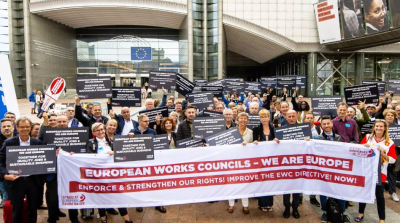Workers in multinational companies are one step closer to the enforcement of their right to meaningful consultation over company decisions after a provisional trilogue agreement was found this morning on the revision of the European Works Council (EWC) Directive.
EWCs are meant to ensure that workers’ rights to information and consultation about management decisions are upheld. However, the current directive lacks the teeth needed to uphold these rights. For example, the maximum fine in Germany is just 15,000 Euro, and is no deterrent effect to a multinational company.
The deal reached between the Polish Council Presidency, the European Commission and the European Parliament on the revision of the directive is an encouraging sign, but a final assessment can only be made once the full text is available. The ETUC’s support will depend on whether the agreed provisions meet the benchmarks set out in its resolution Ten Demands for a Modern European Works Council Directive in the Digital Era.
In particular, the ETUC is calling for significant improvements in two long-standing weaknesses of the current directive:
- Effective and dissuasive sanctions, including financial sanctions linked to the turnover of the company, ensuring that penalties are proportionate;
- Injunctions that allow national courts or competent authorities to immediately halt actions by companies that violate EWC rights until proper consultation and information procedures have been followed;
- Access to justice for European Works Councils and their members, guaranteeing that EWCs have the necessary legal standing and resources to enforce their rights effectively before competent courts and authorities.
ETUC Deputy General Secretary Isabelle Schömann said:
“In times of economic uncertainty caused by global trade tensions such as US tariffs and sweeping transformations driven by the green and digital transitions, workers need strong and enforceable rights. The fact that all three EU institutions have demonstrated their willingness to act on workers' rights is a step in the right direction.
“This is not just a legal clarification—it’s a matter of effectiveness and common sense. Workers must have a real say when decisions affecting their jobs and lives are made at European level.
“European Works Councils are essential and the only transnational bodies to give workers within multinational companies a collective voice across borders. Sustainable solutions to the challenges ahead—whether industrial change or crisis response—can only be found in close consultation with trade unions and workers’ representatives.
“The ETUC will now closely analyse the agreement and continue to advocate for a directive that delivers real improvements, enforces workers’ rights, and strengthens democracy at work.”

